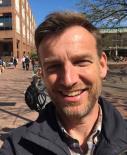Global Migration in Global Society
archive

Global Migration in Global Society
In considering the emerging field of Global Studies, an important question appears to be: what is the unit of analysis? It seems to me the answer lies somewhere in the holistic concept of "global society" - that collectivity of 6+ billion individuals and their interactions. Instead of trying to flesh out a definition, let me instead offer some thoughts on one aspect of the interaction of this collectivity in hopes of sharpening the concept.
While the global movement of products, services, ideas, and information is increasingly free, the movement of people across borders remains tightly controlled. This control over migration is highly controversial because it is the result of two forces colliding: never before have so many people had the ability to move from one country to another while at the same time states have never had so much power to control such movement. This simultaneity leads to numerous controversies, and I'll focus on two: migration links immigration to refugee protection, and it raises questions about national identity.
Both immigrants and refugees are "international migrants" (i.e. people who cross international borders), but immigrants are largely admitted on the basis of national self-interest; the post-war guest worker programs in Northern Europe are good examples of this approach. Refugees, however, arouse a sense of moral responsibility and the treatment of them is guided by an elaborate set of international laws and norms. Refugees are defined by the 1951 UN Convention as individuals who face a well-founded fear of persecution at the hands of their government because of their race, religion, nationality, political opinion or membership of a particular social group. Important to note is that economic hardship is not a criterion for being recognized as a refugee. Some advocates, however, argue that a moral obligation exists to accept poor people, especially those whose poverty stems from internal governmental actions or neglect, or when external governmental or corporate policies are implicated. Such advocates question why nations should privilege a migrant facing death due to persecution over one facing death due to poverty. Opposing arguments assert that, while poverty may raise moral questions, all poor people from all over the world cannot practically be granted refugee status. Where to draw the line between these two positions stirs the pot.
And by making this decision of inclusion, a decision of exclusion is automatically made: who is not part of the people and why not?
The global movement of immigrants and refugees raises the question of citizenship and national identity. Liberal democracies want the people to rule and this wish is declared in such documents as the Preamble to the U.S. Constitution ("We, the people of the United States, in order to form a more perfect union...") and the Declaration of Independence ("When in the course of human events, it becomes necessary for one people to dissolve the political bonds..."). These documents express the essence of a democracy, a term derived from the Greek words demos meaning "people" and kratos meaning "rule." This concept is deceptively simple because letting "the people rule" is by no means a straightforward proposition as it forces the citizens of the country to define the people. Who is going to be included in the demos that is ruling? And by making this decision of inclusion, a decision of exclusion is automatically made: who is not part of the people and why not? Far from being merely abstract questions, they are at the very heart of how we citizens treat foreigners amongst us.
Like most liberal democracies, the United States has a naturalization process for foreigners to become citizens, and I myself went through it by answering such questions as "In what city and in what year was the Declaration of Independence signed?" and "What are the three branches of government?" I also passed a reading and writing test that was absurdly easy for me, but probably quite challenging for others in the room. It made me wonder what kind of test is reasonable to demonstrate that one is now "American." Perhaps it should also be important to demonstrate knowledge about pop culture (what is YouTube?) or current events (what state was recently badly hit by tornados?). Such questions, though, would surely trip up many citizens and would that somehow make them less American? Maybe there should be different kinds of tests for different kinds of foreigners, or no test at all and just grant citizenship automatically after a set amount of time (5 years? 10 years?).
Setting a migration policy forces us citizens to weigh not only how the policy would affect foreigners but also how it would affect us.
To add to the complexity is the fact that citizenship is both a legal status and a form of identity. As a legal status, citizenship provides an individual various rights and duties vis-à-vis the state, and as a matter of identity, citizenship grants an individual the sense of belonging to a larger community. It is noteworthy that there is not always a perfect overlap between the two. For example, an American may enjoy the legal status of being a citizen (i.e. votes and pays taxes) but does not feel like an American (perhaps she spent much time abroad or rejects the values that she sees Americans embracing). The reverse is also possible: a foreigner who does not seek or enjoy legal citizenship but who embraces what he considers to be Americana. The ongoing controversy in Europe over Muslims wearing headscarves in public places is a good example of the difference between legal and identity citizenship: they may be French citizens in one way but not in another.
In the face of global migration, it is therefore difficult to set public policy about who to admit and how to make them part of us. The vast field of policy options between the extremes of "Kick them all out" and "Kumbaya...We are the World" is strewn with monetary and moral questions with which we citizens must grapple. Given other pressing needs, how much money should we spend on border patrol? Should we prefer some foreigners over others? How much power should we grant the government to check for proper documentation? In seeking answers, the debate quickly becomes heated because it touches upon core values regarding civil liberties, human rights and the limited role of government. Setting a migration policy forces us citizens to weigh not only how the policy would affect foreigners but also how it would affect us. For on this issue, there is no clear distinction between us and them. That is a function of global society.



